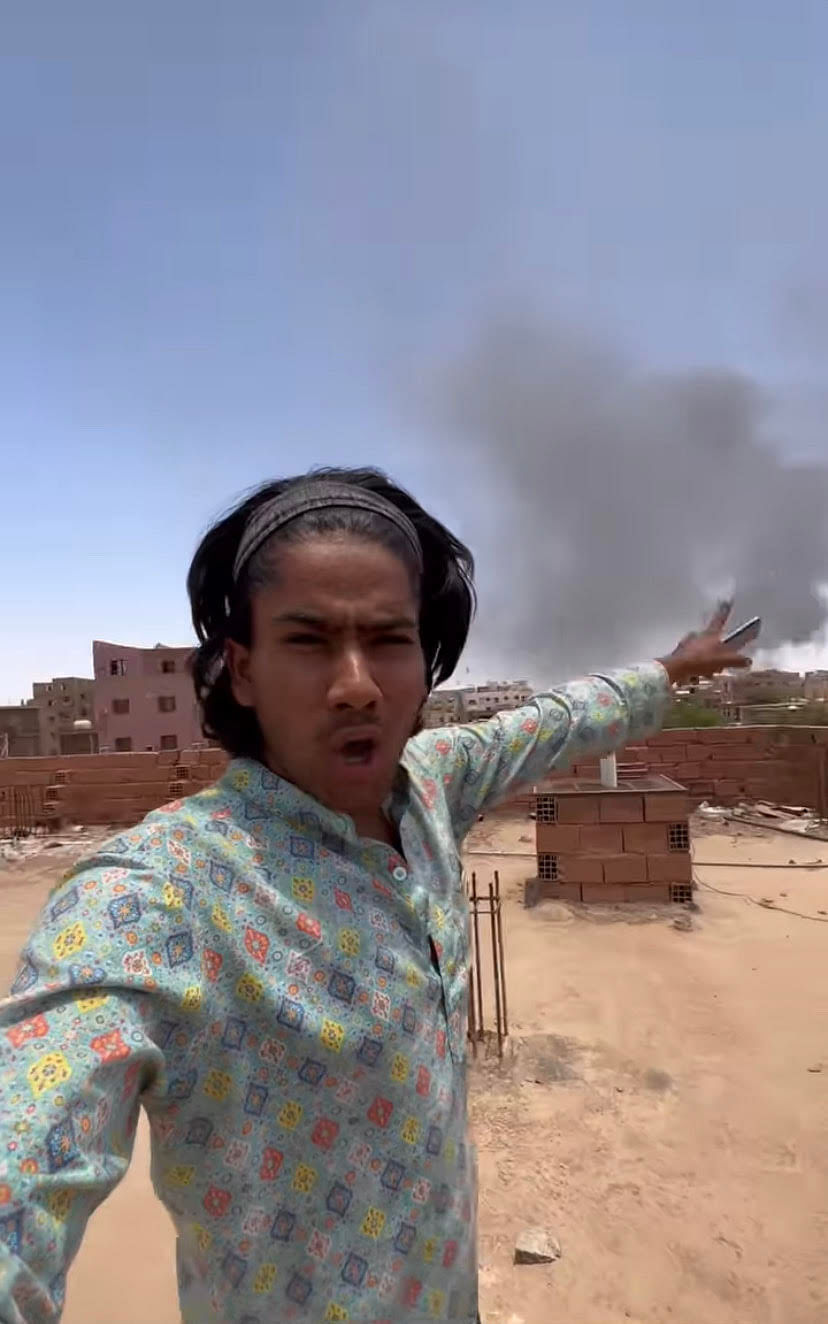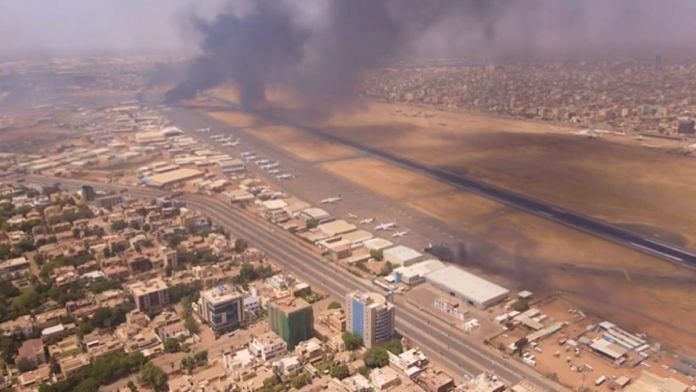New Delhi: On the third day of clashes between the Sudanese army and paramilitary forces, ‘extreme traveller’ and vlogger Maheen S narrowly escaped death as he got caught in the middle of a crossfire in Khartoum.
Holed up in a hotel in the capital with little to no supplies, Maheen and his friend got out to get water, when they came face to face with the armed forces who opened fire. As they made a run for it, they were confronted again, this time by two people bearing guns. The ordeal ended when they finally took shelter in a small hut, where a local man sat, frozen in fear, with a knife in hand for self defence.
“The Sudanese deserve better than this,” says Maheen, one of three Indian nationals stranded in the African country who narrated their harrowing experiences to ThePrint over phone. “They are nice and warm people, welcoming strangers into their homes in times of need.”
The vlogger, who has over 225k followers on Instagram and over 6 lakh YouTube subscribers, and had been travelling across Sudan for the past month, remained in the hut for a few hours with his friend until the armed forces finally left the area.

In another part of Khartoum, Muhammed Shafeeq, an Indian who has been living in Sudan for over 16 years, is huddled in an apartment near the airport with his wife and son.
“Since Saturday morning, we have been hearing constant bombardment and shooting near our home. Thick smoke can be seen coming from the airport where the fighting was taking place over the past few days,” he says. The family is surviving on nothing but rice.
On Wednesday, a “missile-like object” hit the wall of a hotel nearby, leaving behind a massive crater. “Today the fighting has moved away from the airport to a different part of the city we previously thought was safe. The constant sounds of shooting have been fewer today,” says Shafeeq, an employee of Sudan’s DAL Group of Companies, describing the false sense of peace surrounding his home.
There is a sense of urgency in his voice, he fears the call will get disconnected any moment. “We don’t know how long we can survive like this, with barely any food or water. I am scared that the internet will be shut down and I won’t be able to connect with my family in India anymore,” he tells ThePrint.
Armed persons have reportedly been seen looting shops and supermarkets, as well as harassing civilians. Shafeeq recalls hearing of a group of stranded civilians who were threatened at gunpoint and forced to give away their money and food.
Sudan is in the grip of a battle for power between the armed forces and the paramilitary group Rapid Support Forces (RSF) as political factions negotiate on forming a transitional government after a 2021 military coup. The clashes stem from a disagreement between the military and the RSF about how the paramilitary should be integrated into the armed forces and who should oversee that process, according to Al Jazeera.
Despite the army and the RSF agreeing to abide by a US-brokered ceasefire Tuesday, clashes continue to rage on in Khartoum for the fifth consecutive day, leaving residents fearing for their lives and hiding in hotels and bunkers across the city without food, water and electricity. Access to basic amenities is becoming increasingly difficult with supermarkets being raided. For some, going out to buy supplies is a matter of life or death.
Roughly 4,000 Indians are currently stranded in the Sudanese capital. Paras, who wished to be identified only by his first name, travelled to Sudan late last month from Gujarat on business. Currently staying at a hotel near the Indian embassy in Khartoum with six colleagues, he describes the situation in the capital as “critical”.
“We are very scared right now. We haven’t slept for the last 4-5 days and have run out of food and are currently drinking tap water to survive. The electricity comes for one hour a day when we are able to use the internet and charge our phones,” he tells ThePrint over phone.
Paras recalls seeing tanks and soldiers entering from one of the main gates near the hotel. “I don’t know which forces they are a part of, the Sudanese army or the RSF. We don’t think we will be able to return to India safely, please consider these as my last words.”
Pleas for help
While the Ministry of External Affairs set up a control room in Sudan Monday and the embassy has sent out two advisories since Saturday, Indians nationals ThePrint spoke to say little else has been done.
Please stay calm and peaceful. Stay away from open spaces like balconies or terrace. Keep essentials – medicine, water, money, passport, OCI card food ready with you to ensure easy mobility, when feasible.
— India in Sudan (@EoI_Khartoum) April 16, 2023
Vlogger Maheen, quoted earlier, says he had mailed the embassy requesting assistance but never received a response. He did however join one of the many WhatsApp groups created by residents of Khartoum to stay updated with any developments.
Shafeeq, quoted earlier, was a colleague of Albert Augustine, the Indian national who passed away Saturday after he was hit by a stray bullet. Refuting claims that Augustine got shot while opening his apartment window, Shafeeq said the 48-year died after a bullet that ricocheted off his living room wall hit him while he was speaking to his son on the phone.
Shafeeq also helped in the Indian embassy’s efforts to take Augustine’s body to the hospital and his family to safety. “I was one of the company representatives who along with Albert’s family members spoke to the Indian ambassador in Sudan to help take his body to the hospital as it had been 36 hours and they were still struggling to take the body to the mortuary amidst the clashes.”
“The ambassador is very eager to keep us safe and is preparing for the evacuation process. While we haven’t heard anything about when it will begin, the embassy has begun listing all the Indians living in the country, dividing them into different areas and gathering all their passport details and other documents,” he adds.
During its weekly press release, the external affairs ministry stated, “India is engaged with countries in the region that have a key role to play in the Sudan conflict, such as the US, UK, UAE and Saudi Arabia. We have also been working with various UN bodies with a significant presence in the region.”
On Thursday, ministry spokesperson Arindam Bagchi said, “The situation on the ground is still very tense and this renders any movement on the ground as very risky. Therefore, currently our focus remains on the safety and well-being of individuals. We understand the difficulties the people are facing and are in constant contact with them.”
‘It was never this bad’
Shafeeq says he has seen Sudan under numerous regimes, from former president Omar-al Bashir’s tenure until 2019, when he was overthrown and the Transitional Sovereignty Council took over, to the military coup in 2021, led by General Abdel Fattah al-Burhan.
While violence existed in the country over the past few years, tensions were never expected to get this intense, he adds. “We had heard that the army and the RSF were having disagreements but we never expected things to get this violent. We have had regime changes before but none have been this violent.”
Had the clashes not happened, Shafeeq and his family would have been on a flight to India Thursday, to spend the summer holidays with relatives in Kannur.
Instead, they are hiding in their apartment in Khartoum, grappling with thoughts of fear and uncertainty. “We don’t know when we’ll get the chance to see my family in India, but I’m glad I have my wife and child with me. I don’t know how those living alone are surviving,” says Shafeeq.
(Edited by Gitanjali Das)
Also Read: Boat with 160 Rohingyas stranded in Indian seas — ‘don’t have water or food, need urgent help’



